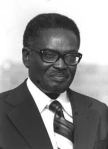
Agostinho Neto was the first president of Angola, and served from 1975 to his death in 1979. He was born in a Methodist family (his father was a Methodist pastor), attended high school in Luanda, and studied medicine in Lisbon (specializing in gynecology). In Lisbon, he befriended future political leaders such as Amilcar Cabral (Guinea Bissau and Cape Verde) and Marcelino dos Santos (Mozambique). He combined his academic life with covert political activities.
In 1948 he published his first volume of poetry and was arrested for the first time. There followed a series of arrests and detention, which interrupted his studies. He joined the Movimento Popular da Libertação de Angola (MPLA, People’s Movement for the Liberation of Angola) when it formed in 1956. He was released from detention and allowed to complete his studies in 1958, retuning shortly afterwards to Angola (1959), where he set up a private medical practice.

On 6 June 1960, Agostinho Neto was arrested at his practice as a result of his campaigning against the Portuguese colonial administration of Angola. When patients, friends, and supporters marched in demonstration for his release, the police opened fire and 30 were killed, 200 more injured. This became known as the Massacre de Icolo e Bengo (his birthplace). Neto was exiled to and held in captivity initially in Cape Verde and then in Portugal, where he wrote his second volume of poetry. After international pressures, the Portuguese government put him under house arrest, where he escaped to Morocco and later to Zaire (Congo).
He became president of the MPLA in 1962, and looked for support in the American government against Portugal, but was turned down. He received the support of Cuba and the Soviet Union for the fight for the freedom of the people of Angola from Portuguese imperialism.
After the Revolução dos Cravos (Carnation Revolution) in 1974 in Portugal, which took down the government by a military coup, Portugal’s foreign policy changed in its African colonies. On 11 November 1975, Angola became independent, and Neto was proclaimed president on that day. The country was effectively held under the rule of three independence movements, with the MPLA holding the central section and the capital.

Neto’s rule was marked by armed conflict with Holden Roberto’s FNLA (supported by Mobutu of Zaire, and the US) and Jonas Savimbi‘s UNITA which had military support from South Africa. While Neto enjoyed the help and support of the Soviet Union and Cuba, he still encouraged Western investment in the country – especially in oil production. He died of cancer on September 10th, 1979 in Moscow. After his death, the civil war in Angola lasted for over a quarter of a century opposing Jose Eduardo dos Santos (his successor) and Jonas Savimbi.
Agostinho Neto was not only Angola’s first president, he was also a medical doctor, and a poet; he is actually one of Angola’s most acclaimed writer and poet. Please check out the website of the Fundação António Agostinho Neto, which has done a brilliant work in presenting Neto’s writings, debates, and comments by other leaders on Neto. Now I leave you with his great saying: “A luta Continua … A Vitória é certa!”


Pingback: Africans and the Trap of Democracy « African Heritage
Thanks for the post. It’s unfortunate to see that only few “Africans” have heard of him.
LikeLike
Pingback: Agostinho Neto by Chinua Achebe « African Heritage
Pingback: Fire and Rhythm (Fogo e ritmo) by Agostinho Neto « African Heritage
Pingback: Happy 2012! « African Heritage
Pingback: Celebrating Angola’s National Heroes Day « African Heritage
Pingback: Commemorating Agostinho Neto’s life – 17 Sept. 1922 | African Heritage
Pingback: Angola – the importance of truth from the left about the MPLA | Africa - News and Analysis
Pingback: Angola's brutal history, and the MPLA's role in it, is a truth that we must tell | Go Zambia JobsGo Zambia Jobs
Pingback: Women of Africa by Sekou Touré | African Heritage
Pingback: Steve Biko: An Outstanding Leader and the Black Consciousness Movement | African Heritage
Incredible history of our leader, teacher, father, revolutionary patriot and a Marxist follower.. I salute you the masses leader against all forms of colonial aggressions by imperialist backward running dogs…history has decided your struggle positively as a revolutionary..Aluta Continue!!!
LikeLike
Pingback: Why the Name: Luanda? | African Heritage
Reblogged this on የዛጎል ዜና – Zaggole News – ለተመጣጣነ መረጃ እንተጋለን.
LikeLike
Pingback: Mugabe and Dos Santos: Africa's old men seem, finally, to be fading away - Airiters
Pingback: Happy 2022! – African Heritage - Nsemkeka
Pingback: South Africa and the Angolan Border War